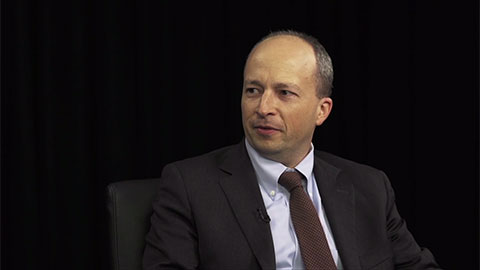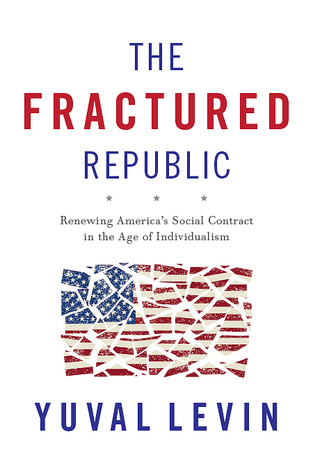Yuval Levin, Hertog Fellow at the Ethics and Public Policy Center in Washington, D.C. is an impressive fellow. After earning a Ph.D. in political philosophy from the University of Chicago, he served as chief of staff of the President’s Council on Bioethics, led by the great Dr. Leon Kass. He became a contributing editor to the Weekly Standard and National Review, and the founding editor of what I consider the best quarterly journal on U.S. public policy, National Affairs.
Levin’s 2013 book The Great Debate: Edmund Burke, Thomas Paine, and the Birth of Right and Left, describes the war of ideas between Burke and radical Thomas Paine, which (he argues) gave birth to the right/left political divide.
For Levin, the Irish-born Burke “was his era’s most devoted and able defender of the inherited traditions of the English constitution. A patient, gradual reformer of his country’s institutions, he was among the first and surely the most adamant and effective critic of the French Revolution in English politics.”
In his new book, The Fractured Republic: Receiving America’s Social Contract in the Age of Individualism, Levin applies the prescriptions of Burke, and the social thought of Aquinas and Pius XI, to our public disorientation and “the cost of dwindling solidarity, cohesion, and social order.”
Levin exhorts readers on both the left and the right that the clock cannot be turned back to good old days. The left’s 1960s Great Society welfare state policies will no longer answer “our every concern.” Conservatives who “talk as though it were always 1981” must realize the Reagan Revolution’s policies are not the cure for what ails America today. Levin also reminds baby boomers of all stripes that the 1950s are gone forever. Gone for the Left is economic consensus; and for the Right, moral consensus.
As a Catholic baby boomer, I am guilty of lamenting the passing of the post-World-War-II golden age of the Church. Growing up in Greenpoint, Brooklyn, the parish was the center of my life. The teaching nuns and priests at SS Cyril and Methodius parish taught me moral and physical discipline, forgiveness and atonement through the Catechism and weekly confessions.
The priests got us off the streets and out of gangs through organized sports in the parish yard and dances at the church hall. For our parents, the parish organized activities through the Holy Name Society, Women’s Sodality, and Communion breakfasts. The parish introduced my family to a unified body of believers who could help and comfort us, spiritually and materially.
But the madness of the 1960s – urban development, social engineering, and the “Spirit of Vatican II” – dismantled the Church’s social foundations in America and brought down many parishes, particularly in inner cities.
In my old neighborhood, there was a parish grammar school every five blocks in the 1950s. Today, there is only one – St. Stanislaus Kostka Academy next to the rectory St. John Paul lodged when he was Cardinal-Archbishop of Krakow.
Levin is correct; we can’t bring back those golden years. He calls on us, however, to implement policies based on what old-time neighborhood Catholics instinctively practiced: subsidiarity.
“Subsidiarity” came to prominence in Pius XI’s 1937 encyclical Quadragesimo Anno: “the fundamental principle of social philosophy, fixed and unchangeable, that one should not withdraw from individuals and commit to the community what they can accomplish by their own enterprise and industry.”
Father Andrew Greeley, a sociologist, put it this way: subsidiarity means “no bigger than necessary” and by structuring life according to this principle, “one can protect, promote and defend the freedom, the dignity, the authenticity of the individual human being.”
Levin agrees and contends that a “decentralized approach in social and economic policy” would be best for confronting our problems. He argues for replacing the centralized administration of social programs with “a widely dispersed network of local, on-the-ground problem-solvers who, given the right kinds of rules and incentives, will be more likely to possess the needed knowledge and capacity to seek our solutions in a flexible way.”
He also calls for empowering local mediating institutions – schools, churches, civic groups, non-profits – that could address problems, “in tailored specialized ways on an ongoing basis.” Levin concludes that this could diffuse the pressures of “hyper-individualism” and “retain the greatest benefits of diversity and dynamism while mitigating some of their greatest costs.”

As for our fragmented culture, Levin concedes that America “has witnessed an extraordinary turn from self-effacing solidarity to self-acclaiming individualism.” The result: our institutions of moral formation – family, religious, civic and educational institutions – have been undermined. There’s a “failure on a massive scale by our society to provide the next generation with some of the basic prerequisites for a truly thriving life.”
The dissolution in recent years of moral norms concerning sex, abortion, divorce, pornography, marriage, driven by the “ethic of expressive individualism” and the rejection of moral judgmentalism, has led to a crisis in the family, which is “the core character-forming institution of every human society,” and has led to “estrangement, isolation and social breakdowns.”
Levin calls on traditionalists to make a positive case to “alleviate the loneliness and brokenness evident in our culture,” to set an example by uniting together to “build living communities from the bottom up” based on universal truths:
Subcultural traditionalism can be embodied in interpersonal institutions of various forms: in civic groups that channel their energies into making neighborhoods safe and attractive, or into helping the poor, or protecting the vulnerable, or assimilating immigrants, or helping fight addiction; in schools that build character and inculcate the values parents think are most important; in religious congregations that mold themselves into living communities of like-minded families, and that turn their faith into works to improve the lives of others; in the work of teachers and students who are committed to liberal learning and engagement with the deepest questions.
This will not be an easy task. Nevertheless, Catholics interested in beginning the long, arduous process to restore a nation “rooted in its morally meaningful community” should study Levin’s prescriptions.
















